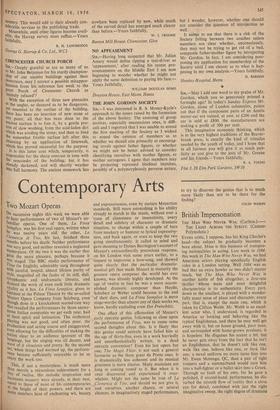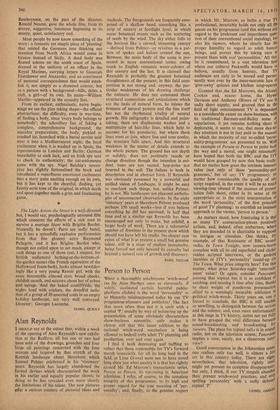British Impersonation THE MAN WHO NEVER WAS. (Carlton.)— THE LIGHT
ACROSS THE STREET. (Cameo- Polytechnic.)
EVERY critic, I suppose, has his King Charles's head—the subject he gradually becomes a bore about. Mine is this business of transpos- ing nationalities in acting. Last week in 1984, this week in The Man Who Never Was, we had American actors playing specifically English roles in a London setting. Well 1984 was so bad that an extra howler or two didn't matter much, but The Man Who Never Was is another kettle of fish altogether, a first-rate thriller whose main and most delightful characteristic is its authenticity. Every part, down to the smallest, is played with a wonder- fully exact sense of place and character; every part, that is, except the main one, which is taken by Clifton Webb. Mr. Webb is an excel- lent actor who, I understand, is regarded in America as looking and behaving like the typical Englishman, and there he may well get away with it; but on home ground, poor man, and surrounded with home-grown products, it is hopeless. He disguises his accent a bit, but he never gets away from the fact that he isn't an Englishman, that he doesn't talk like one, walk like one, behave like one, or look like one; a naval uniform no more turns him into Mr. Ewen Montagu, QC, than a pair of tight trousers and a cummerbund would turn him into a bull-fighter or a ballet skirt into a Greek. Through no fault of his own, for he gave a polished, if second-hand, performance, he dis- turbed the smooth flow of reality that a close eye for detail,' combined with just the right imaginative sweep, the right degree of dramatic
flamboyance, on the part of the director, Ronald Neame, gave the whole film, from its creepy, suggestive, luminous beginning to its creepy, quiet, satisfactory end.
Most people by now know something of the story: a fantastic yet simple piece of 'planting' that misled the Germans into thinking our invasion from North Africa would come in Greece instead of Sicily. A dead body was floated ashore on the south coast of Spain, dressed in the uniform of an officer in the Royal Marines, carrying letters to Generals Eisenhower and Alexander, and an assortment of personal correspondence that would estab- lish it, not simply as a drowned courier, but as a person with a background—bills, debts, a club, a girl---of its own. Its name—William Martin—appeared in the casualty lists.
From its earliest, enthusiastic, naive begin- nings we see the plan taking shape—the official obstructions; the difficulty, even in war-time, of finding a body, since 'every body belongs to somebody'; the schoolboy fun of faking a complete, comprehensive background; the macabre preparations; the body, pickled in crushed ice, launched with a burial service said over it into a Mediterranean night; the local excitement when it is washed up in Spain; the repercussions in London and Berlin; German incredulity at such luck, and an Irish spy sent to check its authenticity; the cat-and-mouse game with the spy. Nigel Balchip's screen- play has slightly fictionalised the book and introduced a superfluous emotional excitement into a story quite exciting enough on its own, but it has kept to the cheerful. dashing, yet faintly eerie tone of the original, in which death and sport together made a grim and fascinating game.
• y
The Light Across the Street is a well-directed but, I would say, psychologically unsound film which concerns the efforts of a sick man to survive a mariage blanc with Brigitte Bardot. Naturally he doesn't. Parts are sadly banal, but it has a splendidly explosive performance from that fine gloomy actor Raymond Pellegrin, and it has Brigitte Bardot who, though not called upon to act much, except at such things as one of those (cut, I suspect, for British audiences) bathing-at-the-bottom-of- the-garden scenes (the French equivalent of the Hollywood foam-bath), looks almost bewilder- ingly like a very young Renoir girl, with the same inscrutable almond eyes, broad cheeks, childish mouth, and mixture about her of urban and savage. And the baked countryside, the nights loud with crickets, the dreadful isola- tion of a group of ill-assorted souls in an empty holiday landscape, are very well conveyed. Director : Georges Lacombe.
ISABEL QUIOLY



































 Previous page
Previous page